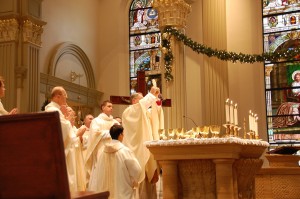 “You received Holy Communion this morning and that is well, but you must do more, make a general confession and offer your communion for the conversion of sinners.” These were the words the Queen of Heaven spoke in 1859 to a Belgian immigrant named Adele Brise in Champion, Wisconsin.
“You received Holy Communion this morning and that is well, but you must do more, make a general confession and offer your communion for the conversion of sinners.” These were the words the Queen of Heaven spoke in 1859 to a Belgian immigrant named Adele Brise in Champion, Wisconsin.
In 1917 the children in Fatima were taught by the angel to pray, “Most Holy Trinity, Father, Son and Holy Spirit, I adore You profoundly, and I offer you the most precious Body, Blood, Soul and Divinity of Jesus Christ, present in all the tabernacles of the world, in reparation for the outrages, sacrileges and indifference with which He Himself is offended.”
In 1935, Jesus appeared to a Polish nun named St. Faustina Kowalska, to whom he revealed the Divine Mercy Devotion. The Divine Mercy chaplet, prayed by many Catholics and Christians, includes this prayer: “Eternal Father, I offer you the Body and Blood, Soul and Divinity of Your dearly beloved son, Our Lord Jesus Christ, in atonement for our sins, and those of the whole world.”
These three private revelations emphasize our participation as a community of believers, united as the body of Christ, to pray for the conversion of sinners, make reparation for sin, and offer atonement. These three exhortations from Our Lady, an Angel, and Our Lord, all emphasize how we can prayerfully offer the Eucharist for a specific intention. This lends itself to how each person gathered for the liturgy has a special role to offer, for our role is not to be a passive spectator, but to be intimately involved in the Eucharistic sacrifice by uniting our prayers to those of the Church offered by the priest.
As you may know, each Mass is offered for an intention by the priest in which a parish accepts Mass stipends. A long standing tradition of the Church has been to offer Mass for deceased loved ones who may be detained in purgatory. The offering of the Eucharist expedites the soul’s purification. The Mass, though, can be offered for any intentions, including the living, and each weekend a parish offers Mass for both the living and deceased members of the parish community.
The intention of the Mass is not restricted to the pastor, but is extended to all of us. After the washing of the priest’s hands, he invites the faithful to “Pray brethren, that my sacrifice and yours may be acceptable to God the Almighty Father.” The sacrifice is not the priest’s; it belongs to the Church, meaning each one of us.
Preceding this invitation to prayer, the Church’s gifts of bread and wine are presented to the ministers, and then the priest offers the bread and wine to God, blessing God who is The Lord of all creation. Each one of those hosts offered to the Lord represents you and me; it represents our intentions and our sacrifices.
Many things come together in order for us to present these gifts to The Lord and call the Holy Spirit down to sanctify them. A farmer has to plant and harvest the wheat, someone has to make the unleavened bread, it is purchased by the generosity of the parish’s parishioners, and then delivered to the parish. The same is true for the wine we offer. What this all means is that the celebration of the Eucharist is an act of the whole community; we are all to join in this offering to the Lord.
Each one of us comes to Mass with our own special intentions. A noble intention that many people pray for is for their loved ones, their sons and daughters, to return to the sacraments of the Church. Jesus tells us today in the Gospel that He is the bread of life and that unless we eat His body and drink His blood we will not have life within us. Our own desire for communion with Jesus Christ compels us to want other people to have that life within them.
We should yearn for those who have fallen away from the sacraments to return so that they can have life. Every time we gather at this altar, we receive the body, blood, soul, and divinity of Jesus Christ and we will be united with Him. The Church continues to make present Jesus Christ in the Eucharist, so that he can offer Himself for the life of the world, so that we will not die, but have eternal life. This desire is Christ, it is the desire of the Church, and the desire of each one of us.
This day then, inspired by Adele Brise, the Fatima Children, St. Faustina, and the tradition of the Church, let us unite our prayers to the offering of the Mass for our needs and intentions. Today intentionally offer your Holy Communion for the conversion of our family members, for financial wellbeing, for employment, for healing, or whatever your intention may be.
This day as we receive the living bread that has come down from heaven, the flesh and blood which allows us to remain in Jesus and gives us life, eternal life, let us resolve as Eucharistic Prayer I says, to offer this sacrifice of praise for ourselves and all those who are dear to us, for the redemption of our souls, in hope of health and wellbeing, and paying homage to the Eternal God.
Let us this day no longer be passive spectators, but join in offering the Church’s sacrifice to the Lord by uniting our prayers and intentions with that of the priest and the universal Church.



